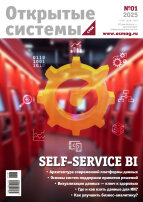.jpg) COVER FEATURES
COVER FEATURES
IT MANAGEMENT
On the Way to Adaptive Computer Systems
With the currently dominant views on strategic IT management being obsolete, in today's uncertain environment it is reasonable to take a course of building highly adaptive systems instead of the traditional making of long-term plans.
Yuri Zelenkov (yuri.zelenkov@npo-saturn.ru), IT director, NPO Saturn
Enterprise Service Management: Taking the IT out of ITSM
New options for service delivery and new demands for portability have taken the IT world by storm. The walls of the traditional data center are becoming fuzzy as a result. Not every IT organization is ready to thrive in this new world. Service Management provides many of the answers to today’s computing challenges by defining a lifecycle that enables innovation and service excellence. Where Service Management often fails is in the interpretation of the lifecycle especially if IT attempts to do it alone and does not truly integrate the processes with the rest of the enterprise. This white paper examines new paradigms for IT support and presents ideas for fostering innovation without sacrificing stability and control. Three case studies offer specifics on how companies have successfully achieved integration between IT and the business, while implementing innovative ideas.
Phyllis Drucker (www.itsmfi.org/content/phyllis-drucker), Business Process Consultant, Linium
Universal ITSM
While ITSM methodology is successfully used in the IT area, to what extent it is useful in other fields? An analysis of all the life cycle stages suggests that following ITSM processes can bring competitive advantage to any business.
Sergey Lyamkov (lyamukov@arbyte.com), director of ITSM processes automation systems, Arbyte
Organization Change Management
Increasingly, when implementing IT projects, the need to change employees' customary behavior is faced. Employees' individual skillsets and personalities, the established principles of teamwork and the organization's operation style are to be taken into the consideration. Those are the reasons the interest in organization change management is growing.
Andrey Kosygin (andrey.kosygin@hp.com), solutions architect, HP Russia
IT Management on the Verge of a Change
It is hardly enough to implement ITIL or COBIT to create a «management Eden»: new technologies constantly motivate the search for new approaches to IT support and management. Clouds, BYOD, Big Data, and mobility bring IT to a whole new level, which consequently leads to dramatic changes in IT management principles.
Marina Anshina (Anshina@mail.ru), Chair, Standards Committee, Russian Union of CIO
The Mystery of DevOps
There is no single understanding of the DevOps notion yet; most certainly, DevOps is to be viewed as a common trend towards the inevitable automation of information systems with the path to such an automation having several barriers, however. So what is this mysterious DevOps exactly?
Leonid Chernyak (osmag@osp.ru), Associate Editor-in-Chief, Research Features, Open Systems. DBMS
Best Practices Pro et Contra
Best practices notion is widely used in today's management terminology. Implementing them is often seen as a guarantee of an organization's efficiency, but to achieve real success, a complex combination of factors is needed that is not always feasible. So is there actually any value in using «best practices»?
Kirill Skripkin (k.skripkin@gmail.com), assistant professor, department of economic informatics, Lomonosov Moscow State University
PLATFORMS
Supercomputer Situational Screen
Real time operation control of a supercomputer is no less important than real time decision making when managing a large city's transport infrastructure or a nuclear power plant. Yet the majority of supercomputer centers have no such a control system, which leads to a huge waste of compute resources due to unnecessary downtime.
Vladimir Voevodin (voevodin@parallel.ru), deputy director, Research Computer Center, Lomonosov Moscow State University
SOFTWARE ENGINEERING
Mobile Application Testing: A Tutorial
To cope with frequent upgrades of mobile devices and technologies, engineers need a reusable and cost-effective environment for testing mobile applications and an elastic infrastructure to support large-scale test automation.
Jerry Gao (jerry.gao@sjsu.edu), San Jose State University, Xiaoying Bai (baixy@tsinghua.edu.cn), Tsinghua University,Wei-Tek Tsai (wtsai7@gmail.com), Arizona State University,Tadahiro Uehara (Uehara.tadahiro@jp.fujitsu.com), Fujitsu Laboratories
SECURITY
Protection for BYOE
When allowing the use of all kinds of personal devices for corporate information processing, IT managers let the genie out of the bottle: confidential information essentially ends up in the wild. For the genie not to wreak havoc, the protected perimeter needs to be stretched.
Mikhail Alperovich (Alperovich.M@digdes.com), director, Laboratory for Protected Mobility, Alexander Sidoruk (Sidoruk.A@digdes.com), software development manager, Mobile Solutions Center, Digital Design
APPLICATIONS
What’s Missing from Collaborative Search?
Research shows that people frequently try to search for information with other people. The fact that no user interface for collaborative searching has yet caught fire suggests that the best parts of the design space have yet to be investigated.
Marti A. Hearstis (hearst@berkeley.edu), professor, University of California, Berkeley.
EXTREME TECHNOLOGY
Three-Dimension Electronics
3D chips will allow to keep the pace set by Moore's law and to build computers of a higher performance.
Leonid Chernyak (osmag@osp.ru), Associate Editor-in-Chief, Research Features, Open Systems. DBMS
OPINION
The Digital Revolution: What's on the Horizon?
The ongoing Digital Revolution and new techno-economic paradigms will challenge organizations and individuals to redefine and upgrade their systems, acquire new skills, and foster new mindsets.
Irena Bojanova (irena.bojanova@umuc.edu), program director of information and technology systems, University of Maryland University College.
OS AСADEMY. LIBRARY
What the Future Holds?
The January issue of Computer Magazine (IEEE Computer Society, Vol. 47, No. 1, 2014) is focused on predictions for the future.
Sergey Kuznetsov (kuzloc@ispras.ru), professor, Moscow State University
